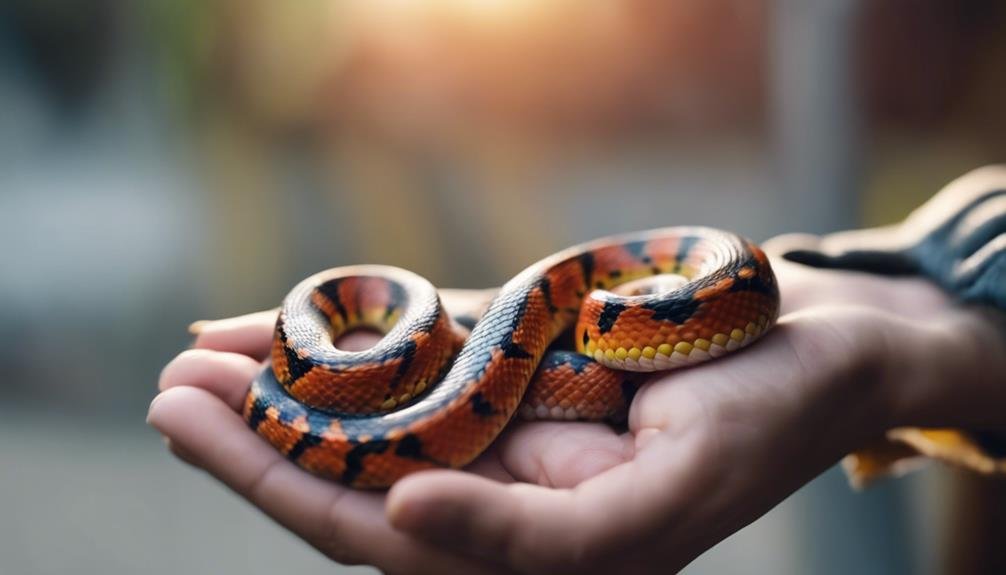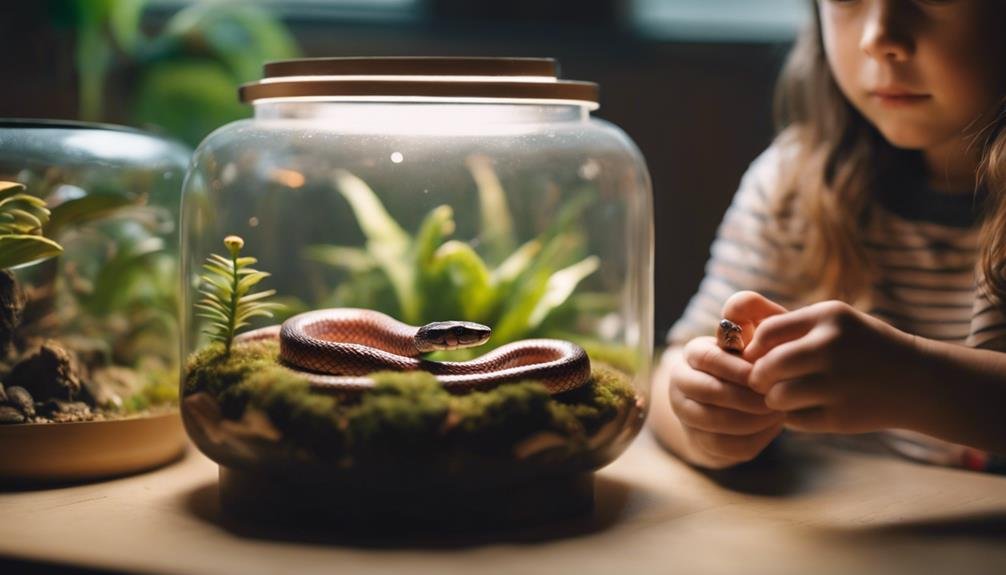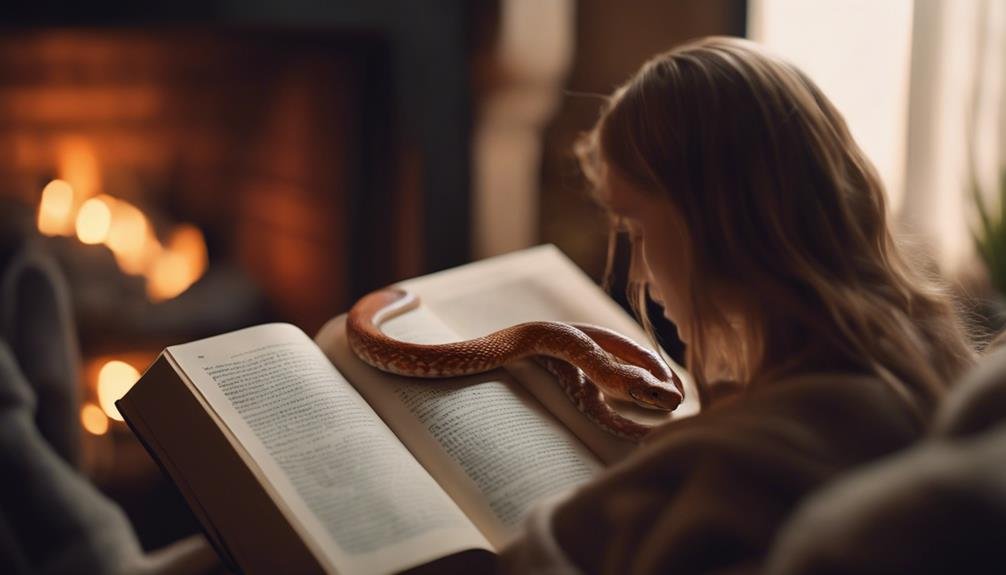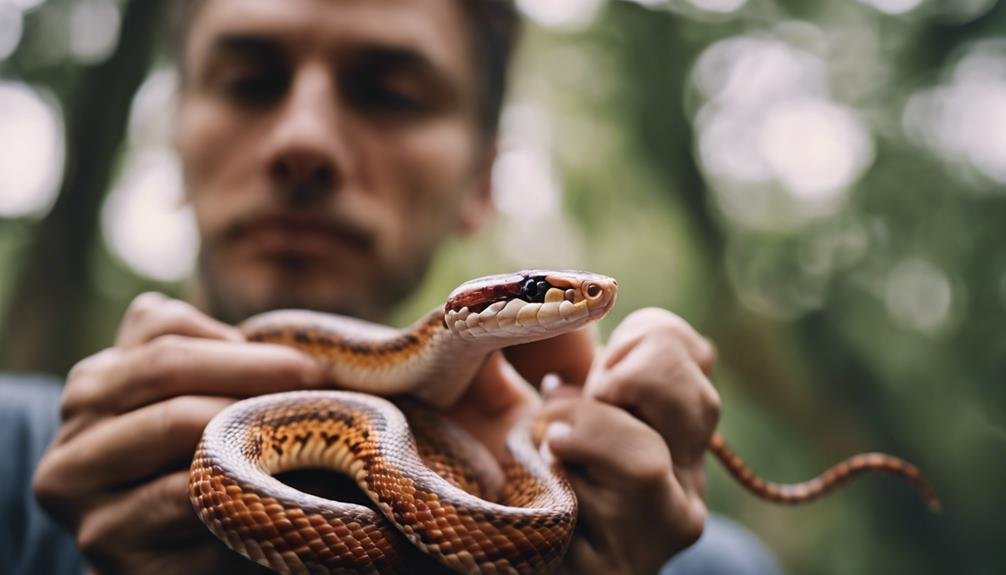You might have heard various tales about corn snakes, leading you to question their safety and whether they should be feared. These non-venomous reptiles are known for their gentle nature, but myths and misunderstandings surround them. What if you could look beyond the misconceptions and learn the truth about their behavior, debunking common fears along the way? Imagine understanding their defensive reactions and knowing how to handle them properly, creating a harmonious relationship. There’s more to these fascinating creatures than meets the eye, and uncovering these aspects may change your perspective on whether corn snakes are truly dangerous.
Key Takeaways
- Corn snakes are non-venomous and pose no venomous threat to humans.
- They are known for their docile nature and rarely bite, even when threatened.
- Proper handling and understanding of their behavior can prevent defensive actions.
- Corn snakes are considered safe pets, even in homes with children.
- Education and familiarization help alleviate fears and misconceptions about corn snakes.
Understanding Corn Snakes
To safely coexist with corn snakes, it’s important to understand their gentle nature and simple needs. As non-venomous reptiles, they pose no significant danger to humans, making them an ideal pet snake for both beginners and experienced reptile enthusiasts. Their docile nature is a key factor in their popularity as pets. They’re known to bite rarely, and should they do so, their bites are usually non-threatening and painless.
Understanding and respecting their behavior is essential for safe interaction. This includes recognizing when they want to be left alone or feel threatened. To make your pet snake feel safe, providing a secure environment that meets their needs, including a warm habitat and hiding places, is important. Corn snakes lay eggs, and ensuring they have a suitable place to do so will further contribute to their sense of security.
With proper handling and a respectful approach to their simple needs, corn snakes are unlikely to cause harm. By making them feel safe and secure, free from unnecessary fear or worry, you’ll enjoy a rewarding relationship with your pet snake.
Common Myths Debunked
You might’ve heard rumors that corn snakes are dangerous attackers, hateful, or aggressive towards pets. Let’s immediately clear up these misconceptions: corn snakes are none of those things.
We’ll examine why these myths persist and set the record straight on their behavior and nature.
Corn Snakes Attack Humans?
Despite common misconceptions, corn snakes rarely lash out at humans unless they feel cornered or threatened. As a snake species known for their obedience, they’re more inclined to retreat than attack.
Understanding their behavior and establishing trust is important, especially during the first three months in a new home. This period is vital in preventing defensive responses as they adapt to their environment. You can greatly reduce any fear they might feel by utilizing proper handling techniques and engaging in regular, gentle interactions.
Venom Threat Reality
Contrary to popular belief, corn snakes are non-venomous and can’t harm humans with venom, as they lack the necessary glands and fangs. This fact alone dismantles common myths, painting them as dangerous.
Instead, corn snakes are known for their docile nature, making them a good choice for pet owners, especially beginners. Their gentle demeanor, coupled with a manageable size, underscores their popularity.
It is important to handle your snake properly and minimize any defensive behavior. This approach will guarantee a safe and enjoyable experience for you and your corn snake.
Understanding and caring for corn snakes properly means they’re unlikely to ever pose a threat, debunking the myth that they’re dangerous due to their venom.
Aggression Towards Pets
Moving beyond the venom myth, another concern often arises regarding corn snakes’ behavior towards other pets in the home. Many fear aggressive encounters, but these worries are mostly unfounded. Corn snakes are particularly docile, posing little threat to other animals. Their gentle nature and preference to avoid confrontation debunk common myths about their aggression.
When introducing a corn snake to your other pets, managing these animal interactions carefully is important. Behavior dynamics between species can vary, yet harmonious coexistence is entirely possible with supervised introductions and strict safety precautions. Understanding corn snakes’ natural behavior promotes a peaceful environment, ensuring they’re a safe addition to homes with other pets.
Recognizing Defensive Behavior
It’s important to recognize when a corn snake feels threatened, as it may hiss, coil, or strike in defense. Recognizing body language and handling cues from your corn snake is essential to understanding their comfort levels and preventing any defensive postures. If you notice your corn snake flattening its body or vibrating its tail, these are clear signs it’s feeling discomfort or fear. Such defensive behaviors are natural reactions to perceived threats or rough handling.
Understanding these signals is key to maintaining a peaceful relationship with your corn snake. Defensive behaviors are their way of communicating unease. By paying attention to these cues, you can adjust your interactions to ensure your snake feels safe and secure. Remember, these behaviors aren’t acts of aggression but rather indicators of stress or fear. Managing your approach and respecting these signals can greatly reduce the likelihood of defensive reactions.
A corn snake’s defensive behavior is a response to its environment. By recognizing and respecting their body language and handling cues, you can create a more positive and stress-free environment for both of you and avoid the triggers of their defensive postures.
The Role of Proper Handling


Mastering gentle handling is essential to guarantee your corn snake doesn’t perceive you as a threat.
It would be best to recognize when your snake feels stressed to avoid defensive reactions.
Importance of Gentle Handling
Gentle handling is key to building trust between you and your corn snake, greatly reducing its defensive behaviors. You establish a foundation for a positive bond by approaching your snake calmly and confidently. Mastering handling techniques, such as redirecting the snake’s focus and avoiding sudden movements, promotes a relaxed environment during your interactions. This approach is essential for trust-building, ensuring your corn snake feels secure and comfortable with your presence.
Consistent, gentle interactions underscore the importance of patience and respect, which are critical elements in nurturing a harmonious relationship. Remember, positive interactions are the cornerstone of a healthy bond with your corn snake, setting the stage for a mutually respectful and enjoyable companionship.
Recognizing Stress Signals
After understanding the importance of gentle handling, you’ll also need to recognize stress signals in your corn snake to guarantee its well-being. Identifying these behavioral cues is a cornerstone of effective stress management techniques. By paying attention to your snake’s reactions, you can adjust your handling strategies accordingly, ensuring a calm and trusting environment.
| Stress Signal | Handling Strategy |
|---|---|
| Hissing | Pause, allow space |
| Puffing | Reduce handling time |
| Defensive posture | Reassess approach |
| Rapid movement | Gently redirect gaze |
Habituation to Human Presence
Building trust through consistent, gentle handling sessions is essential for habituating corn snakes to human presence. Trust-building techniques, like avoiding sudden movements and redirecting their gaze during interactions, play a substantial role in creating a positive environment.
This habituation progress hinges on handling consistency, ensuring that each encounter reinforces the bond between you and your snake. Positive reinforcement, such as regular, calm handling sessions, helps associate human presence with safety, greatly reducing fear.
Handling strategies that focus on fear reduction not only aids in developing a relaxed relationship but also diminishes defensive behaviors. By offering a calm environment and overcoming initial fears, you contribute greatly to the habituation process, making your corn snake more accustomed and comfortable with human interaction.
Creating a Safe Environment


To ensure your corn snake’s health and safety, providing a secure enclosure that meets all its needs is essential. Habitat safety is at the forefront of creating a safe environment for your corn snake. This means ensuring the enclosure has proper heating, humidity, and hiding spots to mimic their natural habitat. A secure lid is non-negotiable to prevent escapes and protect your snake from external threats.
Regularly inspect the enclosure for potential hazards or escape routes. Remove any sharp objects or toxic plants that could harm your snake. Seal small openings to prevent your snake from getting stuck or injured. This proactive approach helps maintain the security and integrity of the habitat, ensuring your corn snake remains safe and sound.
Handling techniques also play a significant role in stress prevention. To calm your corn snake, avoid sudden movements or loud noises around the enclosure. Creating a tranquil environment minimizes stress, contributing to your snake’s well-being. By focusing on these aspects, you’re preventing physical harm and ensuring your corn snake leads a stress-free life.
Building Trust With Your Snake
Establishing a strong bond with your corn snake requires patience and consistent, gentle interactions. Trust-building techniques are vital, like ensuring your handling sessions are filled with positive experiences. Each time you interact with your snake, it’s an opportunity to strengthen your relationship. Gentle handling methods not only guarantee the safety of your snake but also promote snake bonding. By being calm and confident during these sessions, you signal to your snake that it’s in a secure environment.
Incorporating relaxation strategies into your routine, such as gently redirecting your snake’s gaze if it seems fixated on something that might startle it, helps maintain a relaxed atmosphere. This approach prevents your snake from feeling threatened during handling, strengthening a positive bond. When done correctly, regular handling accustoms your snake to your presence and touch, paving the way for a deeper connection.
The Benefits of Corn Snake Companionship


Exploring the benefits of corn snake companionship reveals how their non-venomous nature and docile temperament can enrich your life as a low-maintenance and rewarding pet. With their mild temperament, corn snakes stand out as the perfect companion animals, especially for those new to pet care or looking for an easy-to-manage pet.
Corn snakes’ behavior is fascinating, providing endless entertainment and educational opportunities. They’re known for their gentle demeanor, rarely biting unless they mistake your hand for food or feel threatened. This makes them safe pets for families, including those with children keen to learn about reptile care.
Owning a corn snake offers a unique blend of companionship and ease of care, making them an ideal choice for both beginner and experienced pet owners. Here’s a quick look at what makes corn snakes such great companions:
| Benefit | Description | Relevance |
|---|---|---|
| Safety | Non-venomous and rarely bite | Ideal for families |
| Longevity | Can live up to 20 years | Long-term companionship |
| Maintenance | Require minimal day-to-day care | Suited for busy individuals |
Their small size and gentle nature make corn snakes not just pets but companion animals that can fit seamlessly into your life, providing joy and companionship for years to come.
What Are the Dangers of Corn Snakes, and Should I Be Afraid of Them?
Corn snake bite pain treatments should not be a major concern, as corn snakes are non-venomous and rarely bite humans unless provoked. While a bite may cause some discomfort, special treatment is typically unnecessary. Corn snakes are generally docile and make popular pets for reptile enthusiasts.
Addressing Common Fears
Understanding the nature of corn snakes can help you overcome any fears you might have about these friendly reptiles. These creatures are non-venomous and known for their docile nature, making them an ideal choice for those new to snake ownership. Learning about their behavior and how to handle them properly can greatly reduce your apprehension.
When it comes to fear management and overcoming fears, a few key practices can guide you:
- Education about snake behavior: Understanding that corn snakes are more inclined to flee than fight can reassure you about their peaceful nature.
- Proper snake handling: Gaining experience in handling these reptiles safely can help build your confidence in them.
- Understanding reptile behavior for fear alleviation: Recognizing the signs of stress or discomfort in corn snakes will make your interactions more predictable and less intimidating.
Conclusion
To sum up, there’s no need to fear corn snakes. They’re not dangerous, and you can safely enjoy their companionship with the right approach.
You’ll see they’re quite gentle by debunking myths, understanding their behavior, and handling them properly. Creating a safe environment and building trust is key.
Remember, these snakes offer unique benefits as pets, and addressing common fears with knowledge and care can lead to a rewarding relationship with your corn snake. Corn snakes are dangerous attackers, hateful, or even aggressive towards pets. Safety and whether they should be feared. These non-venomous reptiles are known for their gentle nature, but myths and misunderstandings surround them. What if you could look beyond the misconceptions and learn the truth about their behavior, debunking common fears along the way? Imagine understanding their defensive reactions and knowing how to handle them properly, creating a harmonious relationship. There’s more to these fascinating creatures than meets the eye, and uncovering these aspects may change your perspective on whether corn snakes are truly dangerous.


